World War to Cold War
From World War to Cold War
Power Play of USA and USSR
Background of Incidents
Post war tensions between Truman and Stalin increased after the death of Adolf Hitler in 1945. At the Potsdam Conference, Truman, Churchill and Stalin met to resolve issues on how should Germany be controlled laying the preliminary seeds of the Cold War. Although the defeat of Germany had created a landmark in history, differences between the surviving leaders of the super powers gave birth to a new turmoil.
Churchill, Truman and Stalin
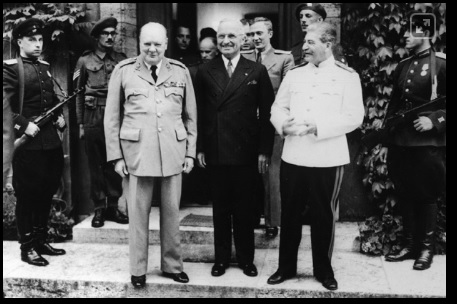
History stands witness to the three mega powers negotiating after Germany’s defeat
Political Differences: Stalin had the intention to take over Germany and control its might in order to ensure no further retaliation from the country. On the other hand, Truman wanted to strengthen the industrialization and democratic forces in the country to increase geo-political stability.
Truman’s Post War Vision in 1948: Truman started the World Bank and the International Monetary Fund in the USA in support of countries that needed substantial financial and development support. He created the Marshall Plan with the vision to rebuild European countries that were destroyed during the war. His principle vision was to initiate enhanced economic and trade collaborations between US and other countries of the world and implement capitalism as an instrument of prosperity in the region. (ESRI, The War of Capitalism vs Communism n.d.)
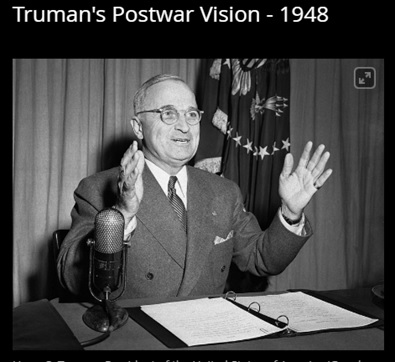
Stalin’s Post War Plans – Stalin’s ideologies were totally against Truman. He wanted to implement communism in Eastern European countries and expand the borders of the Soviet Union. This conflict led to the spurge of the Iron curtain that led to territorial splits between the two countries. (Brandon 2014)
USSR’s expansion into Eastern Europe: Stalin’s vision started taking shape as USSR quickly advanced into Eastern Europe with the Red Army. Post war elections were totally controlled by the Army and elections were neither free nor fair. Although some supporters of the non communist rule existed they failed to raise voices. Politicians in the US were at first oblivious of the Russian dominance but later such views changed. A strong resentment for the Russians developed among US power leaders. (Robinson 1955)
Mutual Conflict from past experiences – The fact that in 1918, Britain and USA had jointly curbed the Russian revolution was fresh in the Russian memory. The Soviets had also joined hands with the Germans in 1939 in the Nazi-Soviet pact which was an early indication of intended deceit and both parties failed to trust each other.
Containment of NATO, 1949- Truman advanced on his political strategies to create a pact with his Western Allies in response to the Soviet’s aggressive plans on dominating most of Eastern Europe. The North American Treaty Organization (NATO) was formed with the Western countries for defense against Soviet measures on gaining political authority in the region. (ESRI, The War of Capitalism vs Communism n.d.)
Truman had said in 1949, “by this treaty we are not only seeking to establish freedom from aggression and from the use of force in the North Atlantic community, but we are also actively striving to promote and preserve peace throughout the world.”
The Warsaw Pact in 1955-
In response to Truman’s NATO, Stalin initiated the Warsaw Pact with other European countries in defense of the US political strategies of gaining territorial authority and destroying Soviet power. The Warsaw pact, signed in Warsaw, Poland in 1955 among countries who were threatened by countries under the NATO alliance. (What was the Warsaw Pact? n.d.) A two world split was created – the East and the West and gave a huge momentum to the Cold War. The Warsaw pact was later dissolved in 1991 after 36 years. (Glass 2017)
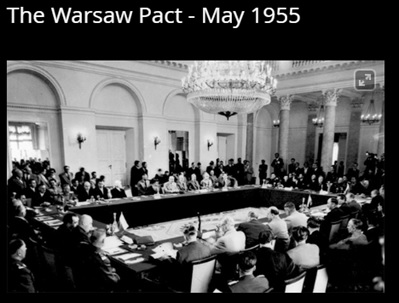
Creation of the Berlin Wall:
Nikita Khrushchev, First Secretary of the Communist Party of the Soviet Union from 1953 to 1964, decided that free movement between West and East Germany had to be stopped to stop East Germans from fleeing to West Germany. On August 13th, 1961 the West Berlin border was closed and the Berlin wall built in a few hours. It had a catastrophic effect on the Germans loosing family and relatives on either side, with loss of jobs and other consequences. (The German Way & More, Berlin Wall Timeline n.d.)
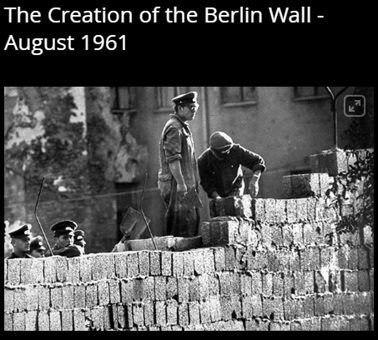
After almost 3 decades, the Berlin Wall was brought down in 1989. Chancellor Angela Merkel decided to demolish the 103 mile historical monument built for power struggle and with tears of the German people. The fight between the Soviets and the Americans had split the country and it was time to dismantle the wall. “Remember the horror of the Berlin Wall, and the joy of unexpected liberation, “said Merkel.
Discussion of Ideological Differences, Nuclear Power Game and Economic Desertion of USSR
A chronology of events led to the emergence of high political strain between the two most powerful geopolitical leaders from US and Russia. Many conflicting views suggest it is the Americans to be blamed with the notion that Truman and Churchill wanted to demolish the Soviets. It stated that the Soviets had only retaliated based on threats with backdrop of the country suffering from economic crisis after the Second World War.
The economic slowdown in Russia was also triggered with Stalin’s refusal to receive aid from the United States through the Marshall Plan. The plan had being designed to help rebuild war stricken bankrupt European economies that had no food supplies and jobs for common people. George C. Marshall framed the Marshall plan, 1947 to relieve the countries from economic stagnation. Through this plan, wherein Russia had refused to take support considering it to be a US high profile political plan to gain support in Europe, a total of $19 bn was spent by US over 4 years in 16 countries in Europe. (Leffler 2018)
It is therefore evident that power play was precedent to all decisions taken by both countries – one that may have attached in favor of the country’s fate and another that may have led to a further disaster. The Post Revisionists claim that the cold war was primarily a clash of beliefs – capitalism vs. communism. The acquisition of atomic weapons by the Americans had triggered boundless fear among the Soviets and had led to events and pacts such as the Truman doctrine, the Brezhnev doctrine and the Cuban crisis.
While the ‘Truman Doctrine’ initiated by President Truman in 1947 vowed to protect all nations that were under the Soviet threat, the Soviets had responded with the ‘Brezhnev doctrine’ in 1968 calling on for military action in all countries where socialist rule was under threat. (Encyclopaedia Britannica 2019)
The Cuban Crisis
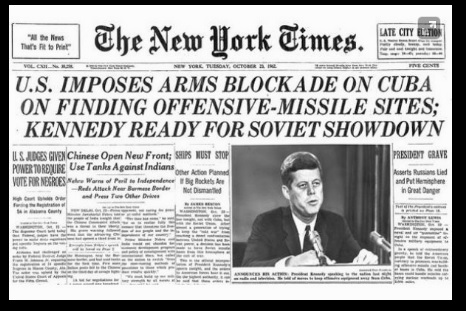
The Cuban Crisis was initiated with the overthrow of General Fulgencio Batista in 1959, an oppressive dictator backed by the US government by a young Cuban nationalist named Fidel Castro. Post such incident, President John F. Kennedy tried several unsuccessful assassinations against Castro trying to free the nation from Castro’s hands. Castro in turn turned to the Soviets for support. In response, Nikita Khrushchev, a leader in USSR, planned to revert with missiles in Cuba, 90 miles from the American soil (Office of the Historian, United States Department of State n.d.).
Kennedy was alarmed with the Soviet missiles and prepared for a war if Soviets disagreed to dismantle missiles from Cuba. The US-USSR then worked out a deal that ensured Americans backing out from Turkey with US planted missiles and the Russians backing out with the missiles from Cuba.
Such incidents spurred because USSR was strongly concerned about its own security with the US instances of atomic invasion in Japan, hydrogen bomb tests in 1952 and in November 1955. Thereafter, US had moved its bombers in Europe, allowing West Germany to re-arm and join NATO. In response, USSR was determined to create its own platform and built the ICBMs – Intercontinental Ballistic Missiles and strengthened the Warsaw Mutual Defense Pact. (Encyclopedia Britannica n.d.)
The End of Soviet Union
The cold war died down after the death of Brezhnev in 1982 when Mikhail Gorbachev became the President of USSR. Mikhail abandoned the Brezhnev doctrine, withdrew troops from Afghanistan in 1988 and refused to intervene in the wave of democratization that gripped Eastern Europe. The Soviet Union ceased to exist in 1991. (The Office of the Soviet Union, US Department of State n.d.)
Conclusion:
The Cold war was codified with mutual aversion among two Super powers – USA and USSR in the backdrop of historical differences in ideology and power play. Post defeat of Germany in Second World War, the outstanding issue was who would gain territorial authority in Europe. With Stalin’s aggressive vision, the US had to plant measures with NATO and pacts to protect US capitalistic and democratic interests in the region and deter Soviets in ruling more than half the world in Europe. Stalin was in turn threatened by the US might of nuclear weapons and strategized associations with the Warsaw pact to combat possible US invasion. The Berlin wall and Cuban crisis have been the disastrous consequences of the Cold war. Ideological differences in capitalism or communism might have stirred the initial rivalry, but towards the end, it was sheer power play that had led to severe economic and political consequences for the two nations.
Bibliography
Brandon, Timothy Snyder and Ray. Stalin and Europe Users Without A Subscription Are Not Able To See The Full Content. Boston: Oxford Scholarship, 2014.
"Encyclopaedia Britannica." Brezhnev Doctrine. 2019. https://www.britannica.com/event/Brezhnev-Doctrine.
"Encyclopedia Britannica." The Warsaw Pact. https://www.britannica.com/event/Warsaw-Pact.
ESRI, The War of Capitalism vs Communism. https://www.arcgis.com/apps/MapJournal/index.html?appid=b8bed133f4b645ed9e1cf8139a1f0172.
Glass, Andrew. "Politico." Warsaw Pact dissolved, March 31, 1991. March 30, 2017. https://www.politico.com/story/2017/03/this-day-in-politics-march-31-1991-236664.
Leffler, Melvyn P. "Divide and Invest: Why the Marshall Plan Worked? ." Foreign Affairs, 2018: July/August.
"Office of the Historian, United States Department of State." The Cuban Missile Crisis, October 1962. https://history.state.gov/milestones/1961-1968/cuban-missile-crisis.
Robinson, Geroid Tanquary. "Stalin's Vision of Utopia: The Future Communist Society." Proceedings of the American Philosophical Society, 1955: Vol. 99, No. 1, pp. 11-21.
The German Way & More, Berlin Wall Timeline. https://www.german-way.com/history-and-culture/germany/history-of-germany/berlin-wall-timeline/.
"The Office of the Soviet Union, US Department of State." The Collapse of the Soviet Union. https://history.state.gov/milestones/1989-1992/collapse-soviet-union.
"What was the Warsaw Pact? ." North Atlantic Treaty Organization. https://www.nato.int/cps/us/natohq/declassified_138294.htm
Buy World War to Cold War Assignment Answers Online
Talk to our expert to get the help with World War to Cold War Assignment to complete your assessment on time and boost your grades now
The main aim/motive of the management assignment help services is to get connect with a greater number of students, and effectively help, and support them in getting completing their assignments the students also get find this a wonderful opportunity where they could effectively learn more about their topics, as the experts also have the best team members with them in which all the members effectively support each other to get complete their diploma assignments. They complete the assessments of the students in an appropriate manner and deliver them back to the students before the due date of the assignment so that the students could timely submit this, and can score higher marks. The experts of the assignment help services at urgenthomework.com are so much skilled, capable, talented, and experienced in their field of programming homework help writing assignments, so, for this, they can effectively write the best economics assignment help services.
Get Online Support for World War to Cold War Assignment Assignment Help Online
Resources
- 24 x 7 Availability.
- Trained and Certified Experts.
- Deadline Guaranteed.
- Plagiarism Free.
- Privacy Guaranteed.
- Free download.
- Online help for all project.
- Homework Help Services
Testimonials
Urgenthomework helped me with finance homework problems and taught math portion of my course as well. Initially, I used a tutor that taught me math course I felt that as if I was not getting the help I needed. With the help of Urgenthomework, I got precisely where I was weak: Sheryl. Read More

